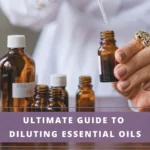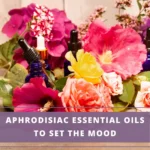As an Amazon Associate I earn from qualifying purchases. See Full Disclosure Here
Citrus essential oils are concentrated extracts obtained from the peels of citrus fruits such as lemon, lime, sweet oranges, and grapefruit.
These oils from the citrus aroma family are known for their fresh, energizing aroma and their many powerful health benefits.
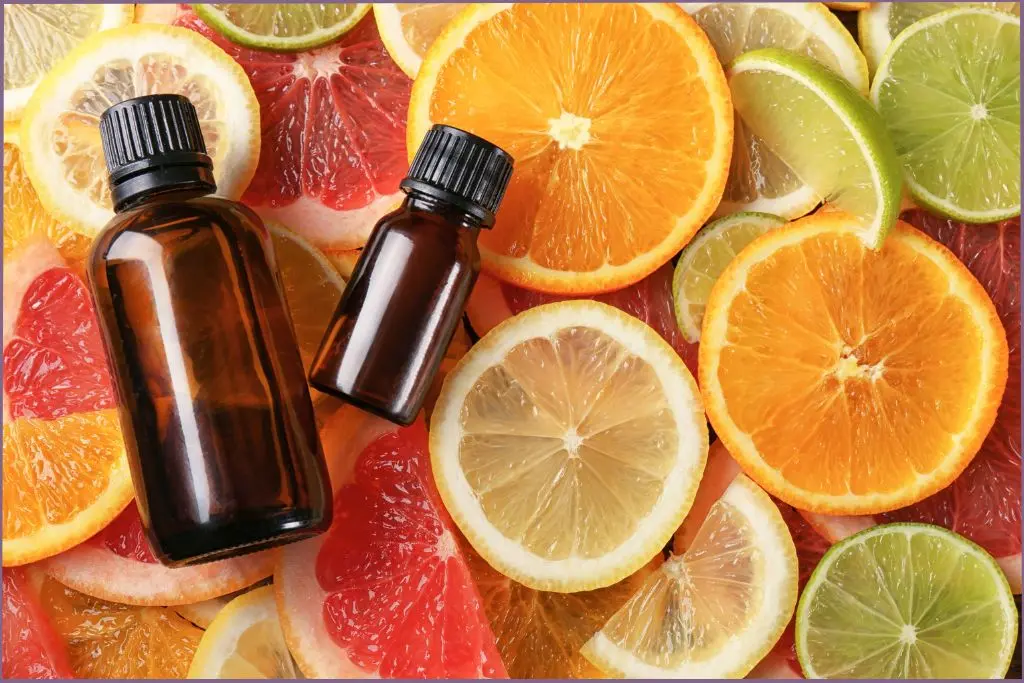
You know the sharp, refreshing scent you get when you peel an orange or squeeze a lemon? That’s in fact the aroma of citrus essential oil emanating from the rind of the fruit.
The next time you peel any citrus fruit, squeeze the peel into the open palm of your other hand. You’ll see the rind will squirt a few drops of concentrated fluid that have a strong citrus aroma. That fluid is made up of essential oil components.
Understanding citrus essential oil benefits, uses, and safety considerations, as well as tips for purchasing quality oils, will help you get the maximum benefits of citrus aromatherapy.
What Are Citrus Essential Oils?
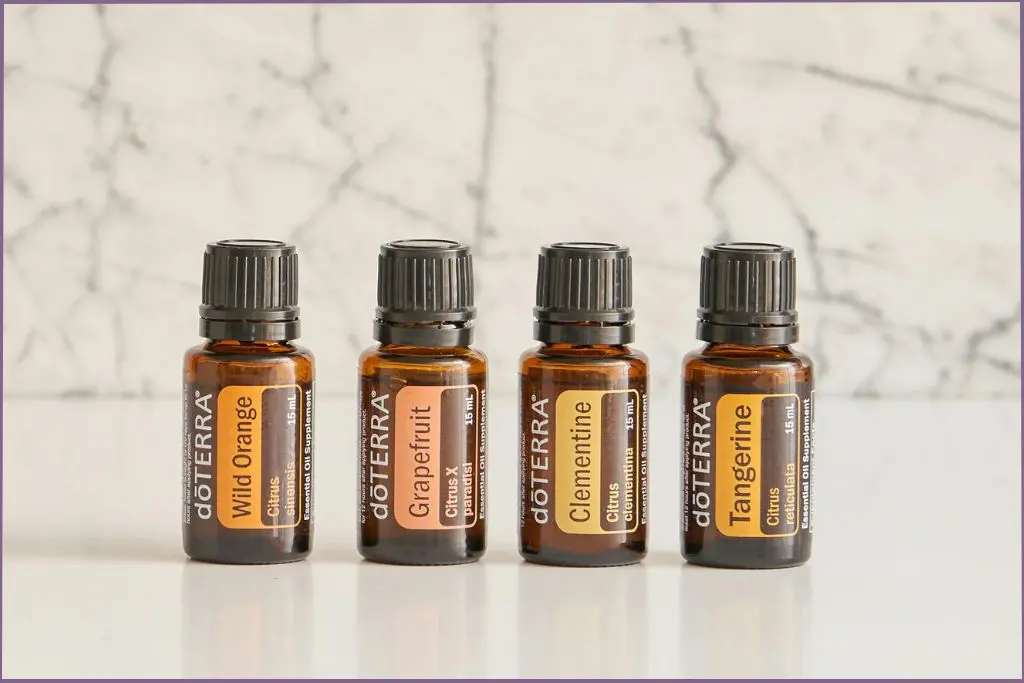
Citrus essential oils are concentrated, volatile extracts derived from the peel of citrus fruits.
While most essential oils are derived from steam distilling the petals, leaves, stalks, or roots of the plant, citrus essential oils are almost always extracted from the rinds of citrus fruits. That’s because the goodness and fragrance resides in the skin of these fruits.
Citrus essential oils are obtained through a process called cold-pressing. This technique gently squeezes the fresh citrus peels, capturing the volatile aromatic compounds responsible for the fruit’s distinctive scent and therapeutic properties.
In the cold pressing method, the citrus fruits are passed through expression machinery that pricks the surface of the rind several times over. This releases the essential oils, which are then filtered and centrifuged from any water or fruit flesh that is gathered during the process.
The result is high quality, pure citrus oils that maintain all of the fragrance and many of the benefits of the original fruit.
High temperatures damage some of the properties of these volatile extracts. Cold-pressing preserves the delicate nature of citrus oils, ensuring you get the most out of these fragrant powerhouses.
The most common citrus oils include lemon, lime, grapefruit, and sweet orange. These oils have a fresh, light, and uplifting scent that can help to improve focus, reduce stress and boost energy levels. They are often added by themselves or in blends to create a pleasant aroma in the home, as well as to provide therapeutic benefits.
Benefits of Citrus Essential Oils
Citrus essential oils have a wide range of benefits including stress relief, improved focus, improved immunity, and even weight loss.
In particular,, they have an uplifting and energizing scent that can help to reduce stress and anxiety, improve focus, and boost energy levels.
This study found that citrus essential oils contain a few major biologically active compounds such as d-limonene, α-terpineol, linalool, α-/β-pinene, and a few others. These compounds possess a number of notable therapeutic properties including antioxidant, antimicrobial, and anti-inflammatory properties, which are beneficial to health.
The antimicrobial and antifungal properties of citrus essential oils play a key role in skin care. They protect the skin from damage by microorganisms, reduce inflammation, and improve skin health.
Many citrus essential oils have proven immunity-boosting properties and are added to many immune-boosting synergy blends and supplements.
Grapefruit can help reduce appetite, which can be great for supporting weight loss.
(+)-Limonene, which is the primary monoterpene in all citrus oils makes them effective for use in surface cleaners, room sprays, and soaps.
Citrus Essential Oil Uses
The crisp, refreshing, and energizing scent of citrus is often associated with spring and summer, although it is just as great any time of the year. To scent the air, add a few drops of any one citrus oil or a blend of oils to your favorite diffuser.
Don’t have a diffuser? Here are 25 ways to use citrus essential oils without a diffuser.
Citrus essential oils have a grounding aroma, with different scents offering slightly different benefits. Inhaling the scents of bergamot and neroli helps ease anxiety and reduce irritability. Inhaling the aroma of grapefruit, sweet orange, and lime uplift your mood and cheer you up.
Known for their anti-aging properties, these oils are used in various skincare creams, and body lotions and scrubs. They are also used in products formulated to treat oily skin, acne, stretch marks, and dermatitis.
Citrus oils are also used extensively in all-natural, environmentally-friendly cleaning products because of their powerful germ-killing and sanitizing properties. It’s surprisingly easy to make your own inexpensive, natural cleaning products using a few basic ingredients and the power of citrus essential oils.
Citronella is one of the most well-known oils from the citrus aroma family that is used in insect repellent products such as candles, bug sprays, and incense.
List Of Citrus Essential Oils & How To Use Them
There are several oils in this family, each with its own unique scent and therapeutic benefits.
Here’s a look at the characteristics and benefits of some of the more common citrus essential oils.
Lemon Essential Oil
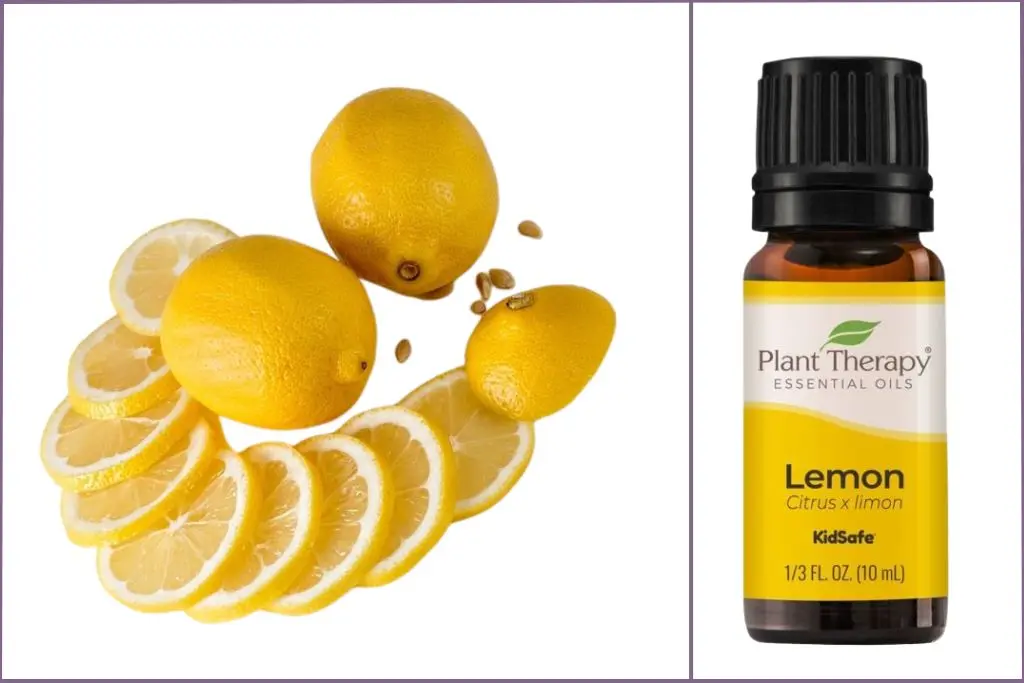
Lemon essential oil is one of the more widely used citrus essential oils. It is rich is limonene, a naturally occurring chemical that gives the oil its distinctive lemony aroma.
It has a bright, refreshing, and uplifting scent that can help sharpen the mind, reduce stress, and improve focus. Using it in your shower in the morning will leave you feeling energized and ready to face the day.
Lemon essential oil can also help to reduce inflammation and boost the immune system.
Diffusing lemon oil is an effective way to clear the room of unpleasant smells.
Sweet Orange Essential Oil
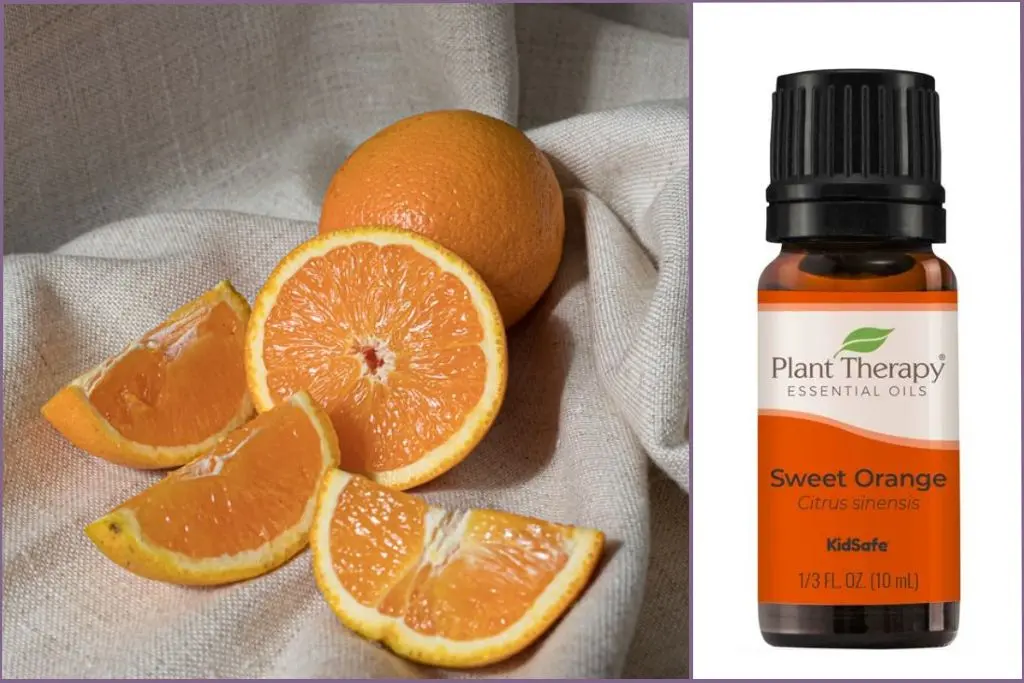
Sweet orange essential oil is another popular oil from the citrus aroma family. It has a sweet, refreshing, and energizing scent that helps uplift mood and reduce stress.
Sweet orange oil is well known for its antifungal and antibacterial properties. It is widely used in natural cleaning products because of its ability to naturally cut grease from the kitchen counter and other surfaces.
Grapefruit Essential Oil
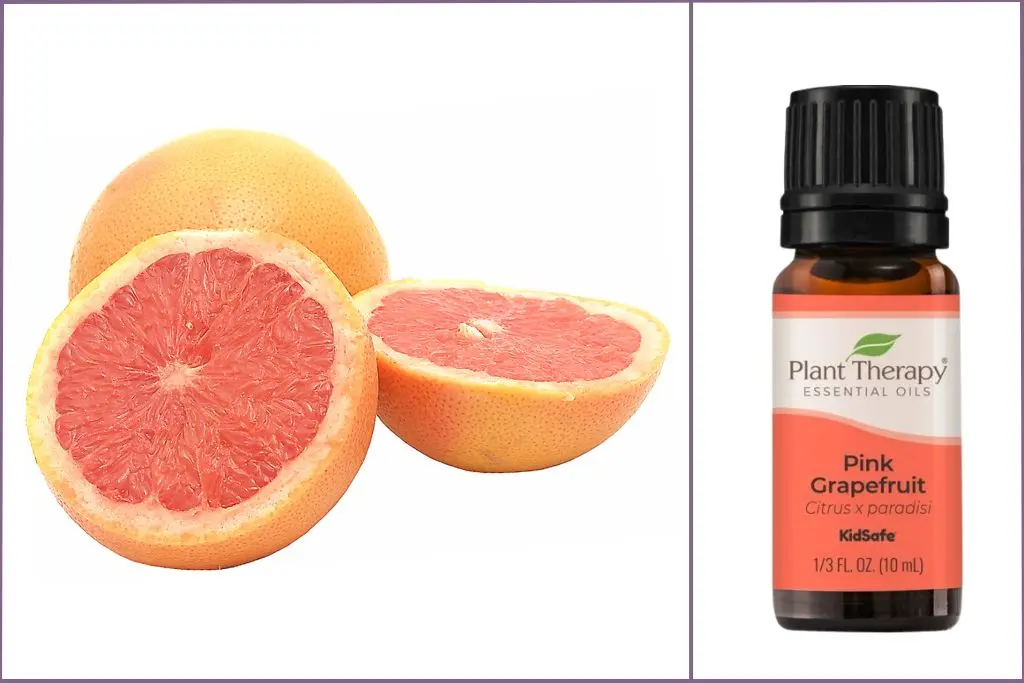
The tart bittersweet aroma of grapefruit essential oil is bright, uplifting, and energizing. Diffuse this essential oil in the morning to help you wake up and in the evening to drain away the stresses of the day.
Inhaling the aroma of grapefruit helps improve focus while working and boost energy levels while working out.
Grapefruit is also one of the best essential oils for weight loss. Inhaling the aroma of grapefruit has been proven to suppress appetite, which helps boost your weight loss endeavors.
Lime Essential Oil
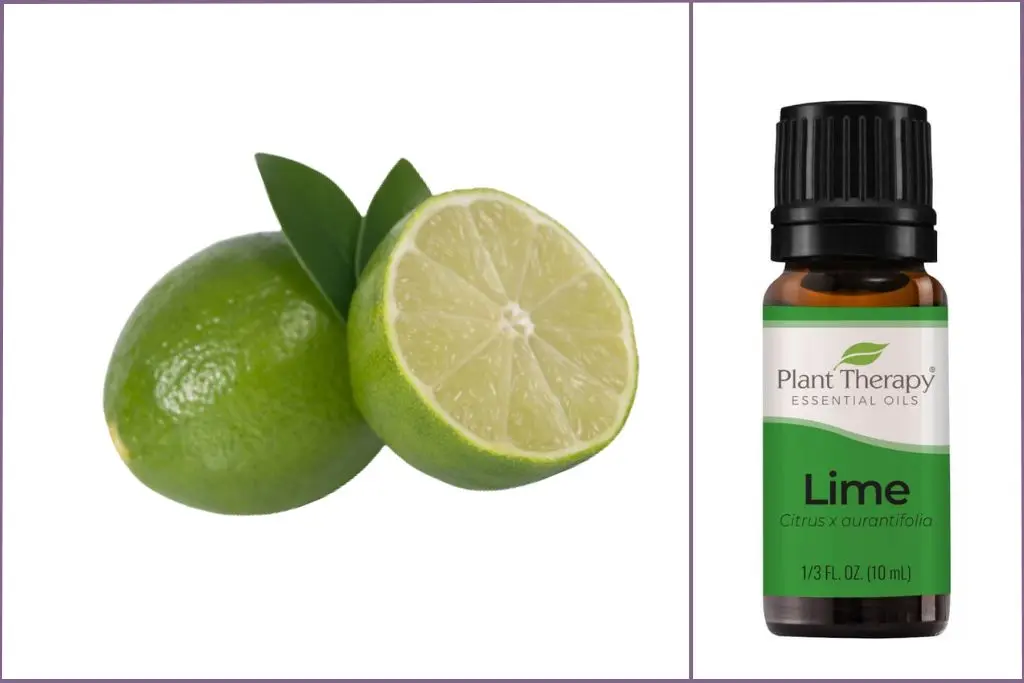
Lime essential oil has a strong citrusy refreshing scent that helps boost energy levels. It’s the best essential oil to inhale when you’re feeling absolutely exhausted.
Lime is the most aromatically potent of all oils in the citrus aroma family. When blending with other oils, a little goes a long way.
Adding too much lime essential oil will overpower the other aromas in the blend.
Lime essential oil often finds mention in folklore for its cleansing and purifying properties and its ability to renew the mind, spirit, and aura.
Essential oil of lime may be extracted by cold pressing or steam distillation. The cold-pressed variety is phototoxic.
Bergamot Essential Oil
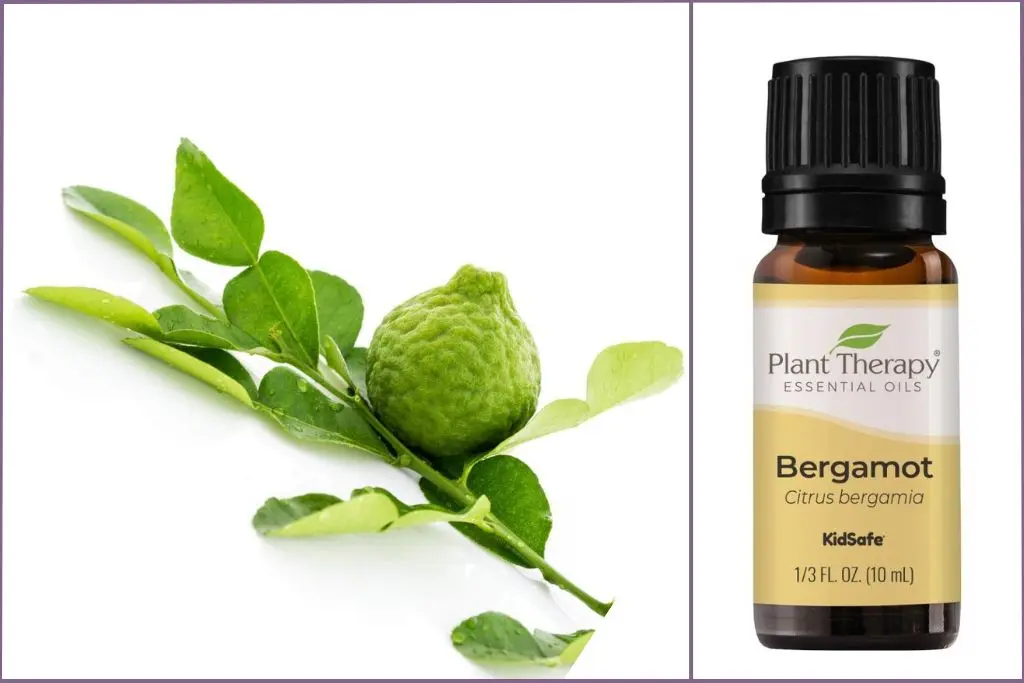
The most complex of all oils from the citrus aroma family, bergamot essential oil has a light citrusy aroma with floral undertones. Inhaling the refreshing, uplifting aroma of bergamot helps reduce feelings of anxiety and boosts mood.
Although bergamot essential oil is known for its ability to combat oily skin and acne, the cold-pressed variety must be used on the skin with caution. This oil is rich in bergaptene, a chemical component that makes the oil highly phototoxic.
Blending Citrus Essential Oils
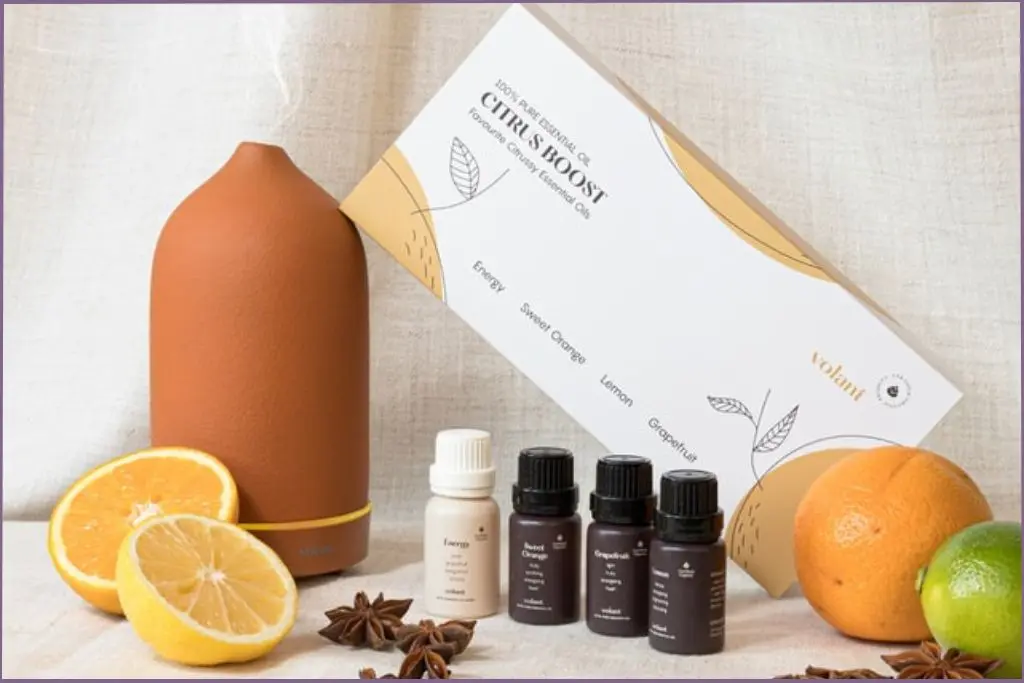
Oils from the citrus aroma family are versatile and can be blended with essential oils from almost all other aroma families to create a variety of unique scents.
In perfume-making, scents from this aroma family are considered top notes because they evaporate quickly. When using citrus in your blends, it’s best to use a base with a subtle scent so that it does not overpower the citrus scent.
Almost all summer diffuser blends use one or more citrus essential oils in combination with a couple of oils from other aroma families.
The most popular spring diffuser blends use a combination of citrus and floral essential oils. These blends give off a refreshing citrusy aroma with interesting floral notes.
During the dark, gloomy days of winter, diffusing blends of citrus and spicy aromas can help fight the winter blues, boost your mood, and lift you out of the doldrums.
Citrus Essential Oil Recipes
Citrus essential oil recipes are often used to make all-natural homemade room sprays, massage oils, bath oils, and more.
For an easy DIY room spray, add 5-10 drops of your favorite citrus essential oil to 1 cup of water and 10 drops of witch hazel. Shake the mixture and spray it into the air.
To make your own homemade bath oil, add 5-10 drops of citrus essential oil to 1 cup of Epsom salts. Add the mixture to a warm bath and enjoy the scent and therapeutic benefits.
Make your own energizing massage oil by adding 5-10 drops of citrus essential oil to 1 cup of almond oil. Shake the mixture and use it as a massage oil.
Safety Considerations for Citrus Essential Oils
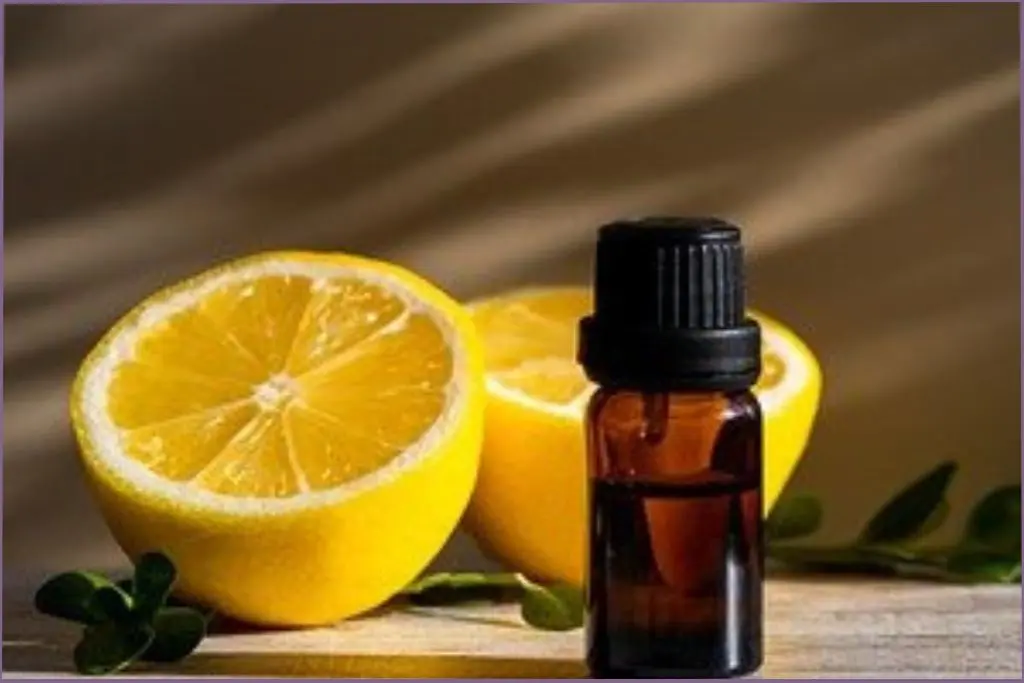
These oils are generally safe to use but there are two risk factors you must be aware of – skin irritation and phototoxicity.
Essential oils are highly concentrated. They must always be diluted with a carrier oil before topical application to avoid skin irritation or any other adverse reaction.
Cold-pressed citrus essential oils can cause photosensitivity. Make sure to avoid direct sunlight after using any citrus-based skin cream.
Tips For Buying Quality Citrus Essential Oils
Good quality should always be your primary consideration when purchasing any essential oils. When buying citrus essential oils, look for those that are labeled as “cold-pressed” or “100% pure” and make sure they have not been diluted with any other ingredients.
Choose organic whenever possible. The rinds of nonorganic citrus fruits are often sprayed with pesticides. Even after washing, trace amounts of pesticides find their way into the cold-pressed extract. Organic citrus fruits are not sprayed with pesticides and the cold-pressed extract is completely pesticide-free.
Where to Buy Citrus Essential Oils
You can buy these from any online or offline store that sells essential oils. The most important thing is to choose a reputable retailer to ensure you are getting the best quality oil.
My two top choices for buying citrus essential oils are:
Plant Therapy – Read my detailed Plant Therapy Essential Oils Brand Review to know why this is my top recommended brand for buying essential oils and related products.
How to Store Citrus Essential Oils to Maximize the Shelf Life
Citrus oils have a shorter shelf life as compared to most other essential oils because of their cold-pressed nature. You must take extra precautions to prevent premature degradation of the therapeutic components in the oil.
Store the oil in a cool, dark place to protect the components and maximize the shelf life of the oil.
Make sure to keep the lid tightly sealed after use and avoid exposing the oil to direct sunlight or heat, as this can damage the volatile ingredients in the oil.
Additionally, make sure to check the expiration date and discard the oil if it has expired.
Citrus essential oils are powerful extracts made from the peels of citrus fruits. These oils have a fresh, light, and uplifting scent that can help to improve focus, reduce stress, and boost energy levels.
Citrus oils can be used in a variety of ways, including scenting the home, aromatherapy, and skin care. Be sure to follow safety guidelines and purchase a quality oil to ensure the best results.
Related Reads:
Essential Oils & Their Aroma Families
Ultimate Guide To Floral Essential Oils
Make Your Own Beeswax Candles With Citrus Essential Oils
Disclaimer: This information is not intended to serve as medical advice. Please consult your doctor before using any natural medication or if you experience any unusual symptoms. See Full Disclaimer here.





